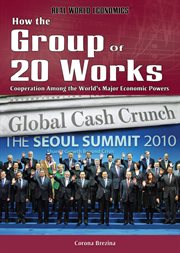Nonfiction
eBook
Details
PUBLISHED
Made available through hoopla
DESCRIPTION
1 online resource
ISBN/ISSN
LANGUAGE
NOTES
In the midst --and in the troubled wake--of the Great Recession, we have witnessed an extraordinary and unprecedented global cooperation among nations committed to collectively discussing, debating, and instituting the best possible economic measures that would restore worldwide growth and prosperity. Through international dialogue, negotiations, and old-fashioned arm-twisting and diplomatic brinksmanship, vulnerable and debt-ridden countries, mostly in Europe, were bailed out and forced to accept austerity spending measures. One of the major players in this economic drama was the Group of 20, an international council of the world's leading industrialized and emerging economies. Initially formed to give greater voice and representation to emerging economies and developing nations and to encourage growth, development, and prosperity worldwide, the Group of 20 evolved during the Great Recession into a fleet-footed, rapid-response crisis management council, seeking ways to craft a coordinated and effective response to the deepening economic turmoil. Readers will follow as this book charts the evolution against the historic backdrop of the Great Recession, while also discussing earlier antecedents of the Group of 20, its organization, membership, and leadership, its membership criteria, its organizational philosophy, mandate, and authority, and its greatest debates, controversies, failures, and successes. Readers discover the surprisingly stirring account of a leadership council adapting to confront a global crisis of historic proportions and an inspiring example of the power of many and the wisdom of the group to tackle and solve even the most vexing of problems. Readers are encouraged to think and engage further with 10 Great Questions to Ask an Economics/Finance teacher and Myths & Facts
Mode of access: World Wide Web







